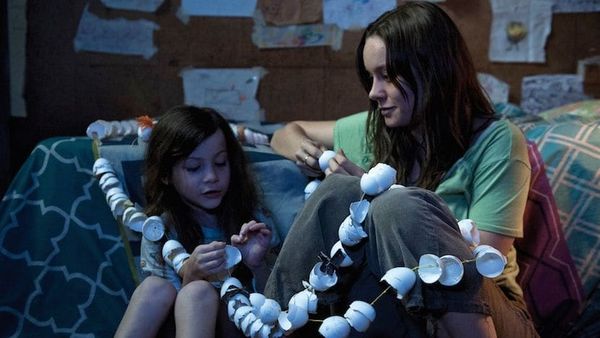Eye For Film >> Movies >> Room (2015) Film Review

Frank and What Richard Did director Lenny Abrahamson takes screenwriter Emma Donoghue’s 2010 bestseller Room, adapted for the screen by the author, and fashions it into a visually inventive, genuinely moving, yet understated drama of captivity and hope, which also sings a quiet tribute to the power of creative maternal impulses. Despite the incredibly grim subject matter, the warm, nourishing and redeeming bond between the two main characters is what ultimately shines through, helped in no small part by the fact that the two leads are superb.
Room rips its story straight from a decade's worth of disturbing news headlines, notably the Austrian Fritzl case, where the imprisonment and abuse of women was carried out virtually in plain sight in the most innocuous of suburbs. Though we are given no background information to ease us into the plot, it soon becomes clear through a drip-feed of details that five-year-old Jack and his twenty-something mother Joy are not a normal single parent family. The boisterous, wide-eyed and long-haired Jack exists in a physical world limited to an 11 sq ft room, which he has existed in since birth. Joy has been held captive here for seven years, seven years which have seen her forced to live off a limited diet and whatever random entertainment material is provided, and repeatedly raped by her male captor, who she and Jack call “old Nick”. Jack is a result of that rape, but intriguingly, the layout of the room (which they refer to as “Room”) and Joy’s parental approach betray an admirable, even noble attempt to raise the naive Jack properly, employing all the care and imagination she can muster to keep her son educated, healthy and happy.

“Room” is a grim place, no doubt, but Abrahamson and his DP make it seem like an enthralling cavern of possibilities, and a much wider space, by keeping the perspective tethered to Jack. Thus we have a lot of shallow focus shots that betray his limited perspective, and hand-held camera work that keeps us weaving and bobbing with the young boy as he zips around the only world he knows, one with walls decorated with drawings and other knick knacks obviously placed by his mother to mask the gritty reality of their prison. Over time, we get a sense of how this topsy-turvy world has been translated to Jack, as unable to broaden her son’s horizons, Joy has constructed an alternate explanation of existence in which nothing exists outside Room except heaven and space far above, somewhere up there above the skylight, which is the only glimpse of the outside world Jack has ever seen. As far as Jack knows, he was sent down from heaven into his mother’s tummy, like some strange superhero origin story. Jack can read and write, but he has difficulty separating “TV reality” from “real” reality. Room is a paradise for Jack and a prison for Joy, but is also a metaphor for the thin walls that protect childhood from the crueller, but unavoidable adult world.
Aside from offering us a strangely compelling look at “alternate” parenting techniques and childhood under the most trying circumstances, this scenario also sets up the later drama to come, as when Joy seizes a chance of escape, this fragile, made-up world she has constructed must inevitably collide with reality. The escape actually comes surprisingly early in Room’s running time, though not after the stark reality of Joy’s situation is made clearer to us. The restricted perspective of the young boy - whom Joy protectively shuts in a cupboard when the night comes - means that the rapes are tastefully kept off camera, but every entry of Old Nick results in well-constructed moments of heightened tension. Seen often through the slats of Jack’s wardrobe or in blurry shallow focus, Nick is a staggeringly ordinary looking monster when finally revealed. Yet a ticking clock is established as it becomes clear that their captor is becoming more and more unstable; he lashes out at Jack during one visit, and then whines he has been unemployed for months. When he spitefully cuts the power off for a day to chastise her during a cold winter period, Joy is confronted with the reality that they have to break for freedom now, or they will die in Room.
The shift of the narrative from Room to the wider world does not rob Abrahamson’s film of any of its power or tension, as both Joy and Jack deal with this dramatic change in unexpected ways and - for Joy at least - new dangers emerge. Uplifting scenes of family reunion do pack an emotional punch, but we are shown how things are swiftly complicated by Joy’s father’s inability to face his new grandson given the criminal nature of his conception. Joy herself can’t bear to show Jack photos of her old life, as they just remind her how all the friends in her snapshots enjoyed seven years of freedom denied to her.
Even Jack himself is now a sort of living, walking and talking reminder of how she can’t go back. Joy was focused so much on taking care of her son and then planning her freedom, that she is totally unprepared for the PTSD and depression that was waiting for her on the other side of Room. Jack ironically turns out to the one better able to adapt (though Abrahamson uses sound and camera flourishes to emphasise his sense of being overwhelmed sensorially at first) as the youngster has no former life to mourn or try to reclaim. Another ticking clock is established: can Joy and Jack find a way to adapt and nurture each other outside of Room as well as they could within it, before Joy breaks?
Room would not work without the ability of actors Brie Larson and Jacob Tremblay to create and maintain a vivid, credible and touching yin-yang relationship, one that has the trappings of normality but has been formed in the most extreme circumstances. Larson makes good on her Short Term 12 promise with a performance that covers a canyon-wide range of emotional states, from terror to numb resignation at the lowest points, to feral maternal protectiveness and playfulness. Tremblay likewise can take Jack from a ball of fierce energy to a huddled, withdrawn wraith without ever coming off as irritating or cloying. Little gestures and affectations, such as the way Jack instinctively whispers in his own play language into his mother’s ear when he is nervous around newcomers, helps sell the idea that these two have been together in that tiny room for all that time.
There are minor niggles. Abrahamson does “cheat” at times and takes us away from Jack’s perspective, though this was presumably to give Larson more room to breathe. The voiceover from Jack jars a little. Sometimes Stephen Rennicks' score too obviously goes for the heartstrings and works against the generally understated approach. Still, to have encouraged such great performances from a young cast while constructing such a fascinating exploration of captivity, childhood and parenthood out of such dark subject matter is no mean feat for a director. Abrahamson has shown himself more than capable of moulding challenging source material into compelling, well-acted dramas over the course of an eclectic career and this outstanding film simply confirms his place in the top league of indie filmmakers today.
Reviewed on: 17 Oct 2015














